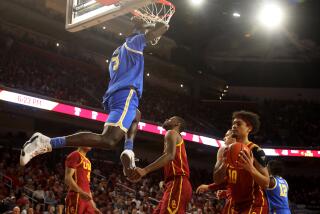Segota Just Lets His Feet Do Talking
SAN DIEGO — Not many people really know Branko Segota. It’s easy to dismiss him as just another arrogant athlete.
Even a guy such as Brian Quinn, who has been Segota’s teammate on the Sockers for six seasons, is virtually stumped when asked to give a little insight into Segota’s personality.
“I don’t know,” Quinn said. “I honestly don’t know. He’s a pretty private individual.”
When someone is private, people try to figure out why. So Segota often hears people say he is a snob or aloof or full of himself.
Maybe he is aloof sometimes. It is easy to be that way in a season such as this, which Segota has said has been the worst of his career. It’s not that he hasn’t been productive. A midfielder, he leads the team in points with 27 goals and 34 assists. But there have been too many losses, and he has been in the middle of clashes between Steve Zungul, his teammate, a fellow Yugoslav and good friend, and Ron Newman, his coach.
For those reasons, he doesn’t always want to talk with Joe Soccer Fan after a game. But because he has been a part of seven Major Indoor Soccer League championship teams, more than any player, and because he is one of the league’s few real stars, Joe Soccer Fan expects him to talk. Everybody wants an autograph, a picture or an interview. He usually signs, poses and talks. When he doesn’t, he hears complaints.
No one ever said Segota had the patience of a saint. With the possible exception of his right foot, Branko Segota is human.
“I just don’t like when people judge you, and they don’t know you,” he said. “Sometimes you don’t feel like being bothered, or you don’t like to talk to somebody. They expect you to always be nice and everything. We’re human beings as well, and they have to realize that sometimes we don’t feel like talking and they should leave us alone.”
Segota, 28, is somewhat of a contradiction. Over a nine-season career, he has become the second-leading scorer in MISL history (390 goals and 326 assists) behind Zungul (652, 471). So that puts him in the spotlight. But he doesn’t go in for all the flashy stuff that goes with it, such as jumping on the glass, waving a towel or doing back flips.
“I haven’t been brought up that way,” he said. “I’ve been brought up with the outdoor game. There’s a certain class of players that are very calm, and they don’t jump on the glass. I don’t believe that’s soccer. That’s a show.”
Because the shows sell the most tickets, Segota has been encouraged to be more emotional and celebrate his accomplishments with more enthusiasm. He tried jumping up on the glass a few times, but it made him uncomfortable.
“I felt really out of place,” he said, “and I asked myself ‘What the hell are you doing?’ It’s not me. I can’t do that.”
He also isn’t one for small talk. Segota will see teammate Jacques Ladouceur striking up a conversation with anybody, anywhere, any time. He calls him “Mr. Social.” It’s hard for him to imagine being able to do that.
“I’m reserved. It takes a lot for me to talk with somebody unless there’s something interesting for me to talk about,” Segota said. “I’m very quiet until I get to know a person.”
Ron Fowler, the Sockers’ owner, is one of the few people within the organization who has gotten to know Segota. It didn’t happen overnight.
“It took awhile,” Fowler said. “I think Branko is a very bright but introspective young man. Branko is just not as expressive as some of the players on the team. I think many people don’t understand that he’s a very sensitive individual. He is easily stung by criticism. He hides that.”
That might explain why this season has been a nightmare. Everything started off nicely. For the first time in years, Segota arrived at preseason training on time, with a smile on his face. The Sockers won four of their first six games, and Segota was in top form.
Everything soon fell apart. There were injuries, losses and verbal jousts between Newman and Zungul, who has played sparingly. Neither the team nor Segota ever really recovered.
“It started out really well, and all of a sudden everything turned sour,” Segota said. “Everything that could go wrong went wrong.”
A big part of Segota’s problem centered on Zungul’s, though he says that isn’t on his mind much any more. Zungul has been told he can no longer practice or play with the team because of arthritic hips.
“I’m not really thinking about it as much as I did,” he said. “He’s not playing, and he hasn’t been playing for a while. But it’s not just Steve. There are too many things that are going wrong. It’s just one of those weird seasons.”
So weird, in fact, that it has affected Segota’s play. Sometimes he’s there, sometimes he’s not.
On March 13, one week after the Sockers traded Zoran Karic for Paul Wright, Segota scored a hat trick and had two assists in a 9-3 victory over St. Louis. In other games, he has done little more than take up space.
“Some games, he’s been superb,” Quinn said. “Other games, he’s been non-existent. I don’t know if it’s the way the team is or if the problems with Steve have affected him, but he hasn’t been a happy camper.”
Said Newman: “We can all have poor games. Everybody is entitled to a poor game. Quinny has games where he makes mistakes, but he’s always active. Branko just disappears when he’s not playing well.”
Part of the reason for that is undoubtedly pressure. The Sockers are no longer a head above every other team in the MISL. They are young and have potential, but they rely heavily on Segota’s contributions. He no longer has the magnificent cast of scorers at his side, as he did when playing with a healthy Zungul, Juli Veee and Kaz Deyna.
“When this team looks for someone to explode, that’s who we look to,” Quinn said. “It’s not just his scoring that we need, it’s everything else. It kind of lessens the load for everyone.”
One of the biggest unanswered questions about Segota is what really drives him. Looking at the big picture, it is apparent that winning championships is of great importance and, certainly, the fact that he has won seven indicates he knows what it takes. But what about every day? What about the middle of the season, when there is no championship at stake?
“The one thing I’ve never been able to figure out about Branko is what motivates him day in and day out,” defender Kevin Crow said. “Some days you look at him and say ‘He’s unbelievable’ and other days, it’s like he’s not there.”
So what does motivate him?
“I love the game,” Segota said. “I love soccer. I want to give back everything that I can.”
But there’s a catch. There is a part of him that feels a little cheated by this sport. Members of the MISL elite have never had money waived in their faces.
“Guys who have won three or four championships really don’t have anything to look forward to,” Segota said. “That’s the only thing they have is to go out and win the championship. You have to get past that and try to motivate yourself to do well for yourself and for your team. Sometimes that is the hard part.”
Though Segota’s salary of $102,000 a year is the highest in the MISL, he felt the impact of the league’s financial problems two years ago when his pay was cut in half. He readily admits that affected his motivation, which isn’t something Newman necessarily faults him for.
“We all, including me, were hurt by that,” Newman said. “You work to create a position in life, and then suddenly that position is taken away from you. That can’t help but hurt your motivation.”
It takes away the fun, too. Despite his reserved nature, Segota has the reputation for having a good sense of humor. There haven’t been many laughs this season. Not like in the past.
There was the time in Wichita when Newman told all the players to have a drink on him to celebrate goalie Zoltan Toth’s birthday, then retired to his hotel room. Toth had already bought a bottle of cheap champagne, but Segota decided this called for something a tad more expensive. So he ordered four or five bottles at $77 a pop, and the gang drank to Zollie’s health.
Well, long about checkout time, Newman got a gander at the bill and just about hit the roof.
“You should have seen his face,” said Segota, laughing. “It took him about seven or eight days to figure out who did it.”
On the field, Segota probably has more natural talent than anyone in the league. Of all the things he does well, including his soft dribbling touch and ability to find the open man with a perfect pass, it is his shot that people marvel at. It was clocked at 78 m.p.h. at the All-Star speed-shooting competition, has fractured three ribs of an opposing defender and given two black eyes to a goalie it hit square in the face.
“I saw him about four years after,” Segota said, “and he says he still has pain over his eye.”
High bar tabs, cracked ribs and black eyes aside, Segota’s biggest joy is winning championships. For that reason, he has never dwelled much on his statistics.
“I’ve never been greedy about scoring,” Segota said. “That’s what I like about this game. There’s so many things you can do and still feel good about yourself.”
Winning is the biggest.
“I like to win,” he said. “I don’t like other people throwing things in our faces saying ‘Hah, hah, hah, you had a bad year.’ I always like to be on top.”







